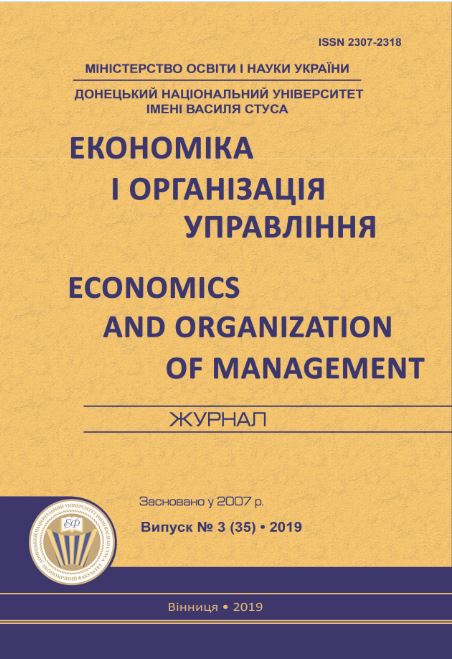Economic content of debt to suppliers and contractors in the framework of management decision-making.
DOI:
https://doi.org/10.31558/2307-2318.2019.3.3Keywords:
accounts payable, liabilities, management decisions, economic content, suppliers and contractorsAbstract
Accounts payable, in particular, payables to suppliers and contractors are a significant component of debt capital as a source of financing for any business. Effective management of it involves optimization of size and structure, which is impossible without awareness of the definition of the essence by managers. Given the impact of payables on the financial performance of the entity and its business image as a whole, the study of its nature is relevant. The question of the unity of the treatment of accounts payable in scientific discussions and accounting regulations remains unanswered so far, which negatively affects the effectiveness of micro-level management. The purpose of the article is to study the economic content of accounts payable in the work of domestic scientists and regulations in terms of determining its impact on management efficiency. The paper provides a critical analysis of the works of domestic scientists in the field of accounts payable research and provides a comparative analysis of national and international regulations on its accounting. According to the results of the research, the problem of lack of uniform interpretation of the concept of accounts payable in domestic accounting regulations was identified as a factor that impedes effective management of settlements with suppliers and contractors. Also identified are the following problematic aspects of debt management: the lack of a separate legal act regulating the accounting of accounts payable in Ukraine, differences in the interpretation of terms, recognition, classification, assessment of debt in domestic and international accounting standards. To address the identified issues, it is proposed to apply international standards as binding on all entities in Ukraine. The direction of further research is the search for ways to improve the process of debt management.References
Гончарук Р.П. Сутність та класифікація кредиторської заборгованості: колізії наукових підходів. / Р.П. Гончарук // Вісник Житомирського державного технологічного університету. Серія: Економічні науки. – 2015. – №. 1(59), Ч. 1. – С. 48- 51.
Дублей В.В.Необхідність управління дебіторською та кредиторською заборгованостями в сучасних умовах. / В.В. Дублей, М.М. Гуменюк // Журнал Науковий огляд. – 2016. - № 11 (32). – С. 1-9.
Чорненька О. Б. Аналіз наукових підходів щодо сутності кредиторської заборгованості та її класифікації. / О. Б. Чорненька // Вісник економічні науки. – 2017. – №20. – С. 207 – 212.
Хохлов М.П. Управління дебіторською та кредиторською заборгованістю підприємства / М.П Хохлов, О.С Корнієнко// Економіка і суспільство. – 2017. – №10. – С.402-407.
Майборода О.Є. Характеристика сутності та поняття дебіторської і кредиторської заборгованості. / О.Є. Майборода, І.П. Косарєва, І.О.Корабейнікова // Економіка і суспільство. – 2018. – №15. – С. 396-402.
Томчук Е.Ф. Аналітичне забезпечення управління кредиторською заборгованістю підприємства. / Е.Ф. Томчук // Науковий вісник Львівського національного університету ветеринарної медицини та біотехнологій імені С.З. Ґжицького. – 2016. – № 2 (69). – C. 160-164.
Про бухгалтерський облік та фінансову звітність: Закон України № 996-XIV від 16.07.1999 р. за станом на 16.09.2019. [Електронний ресурс] / Режим доступу: http://zakon3.rada.gov.ua/laws/show/996-14.
Національне положення (стандарт) бухгалтерського обліку 1 «Загальні вимоги до фінансової звітності»: наказ Міністерства фінансів України № 73 від 07.02.2013 р. за станом на 16.09.2019. [Електронний ресурс] / Режим доступу: http://zakon2.rada.gov.ua/laws/show/z0336-13.
Цивільний Кодекс України № 435-IV від 16.01.2003 р. за станом на 16.09.2019. [Електронний ресурс] / Режим доступу: http://zakon4.rada.gov.ua/laws/show/435-15.
Положення (стандарт) бухгалтерського обліку 11 «Зобов`язання»: наказ Міністерства фінансів України № 20 від 31.01.2000 р. за станом на 16.09.2019. [Електронний ресурс] / Режим доступу: http://zakon2.rada.gov.ua/laws/show/z0085-00.
Міжнародний стандарт бухгалтерського обліку (IASВ) 37 «Забезпечення, непередбачені зобов’язання та непередбачені активи». [Електронний ресурс] / Режим доступу: http://zakon2.rada.gov.ua/laws/show/929_051.
Хомик П. М. Порівняльний аспект обліку заборгованості підприємства за П(с)БО та МСФЗ (IAS). / П. М. Хомик, М. А. Кулик // Проблеми теорії та методології бухгалтерського обліку, контролю і аналізу. – 2012. – № 3 (24). – С. 503-510.
Гевлич Л.Л. Особливості підходів до визначення сутності поняття «поточні зобов’язання» та їх класифікації. / Л.Л. Гевлич, Л.І. Катранжи // Фінанси, облік, банки. – 2017. - №1 (22). – С. 70-78.

